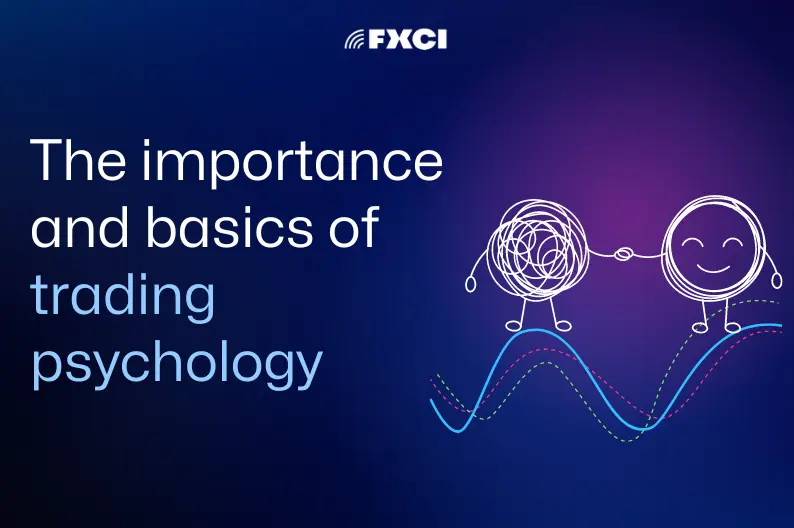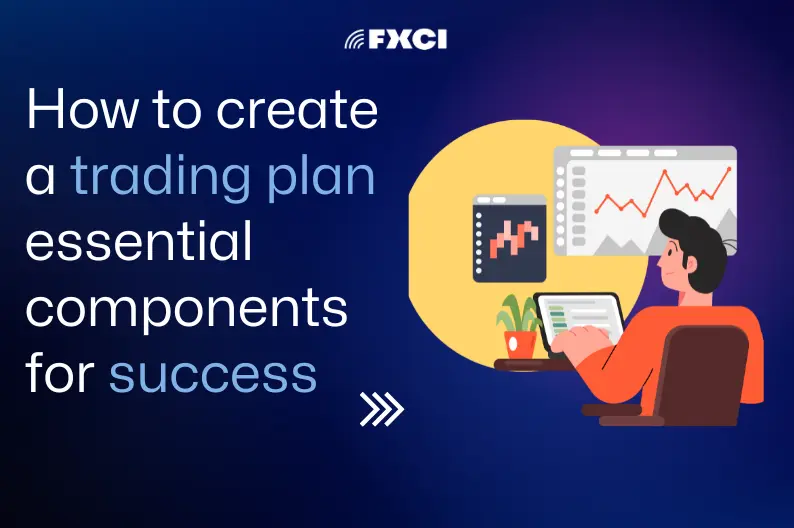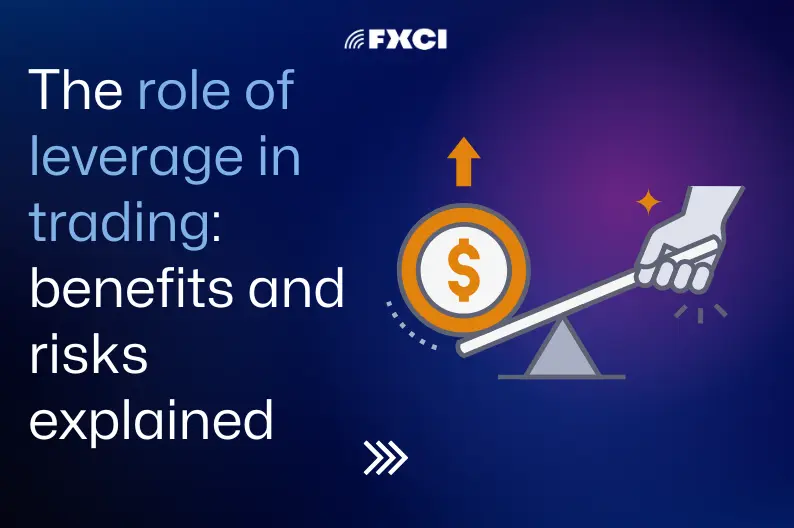
Trading is a very competitive and volatile business, and to be successful, one must have more than simply knowledge of the market and technical analysis. Indeed, trading psychology is frequently disregarded despite being one of the most significant aspects of trading.
The mental and emotional condition of a trader is referred to as trading psychology, and it is a significant factor in each trader's decision-making process. In this article, we will discuss why it is so essential to acquire the psychology of a successful trader and what characteristics these traders possess. Of course, FXCI experts will give specific recommendations on how to purchase the psychology of success in trading.
Why does having a good mindset matter so much?
The fact that the financial markets are devoid of emotions is something that the majority of traders fail to take into consideration. When it comes to market circumstances, there is no such thing as intrinsically excellent or poor conditions. You are the only one who can decide how you feel about them. A deal that you believe to be poor may be a lucrative chance for another person.
Trading, therefore, is purely subjective and dependent on the feelings and actions of the trader who is trading. Your frame of mind shapes how you behave when you are under pressure. All living things, when they are in peril, respond to their instincts. No exception is made for humans. An unexpected move in the market may also be classified as being "in danger" in our minds. As a result, many traders allow their emotions to influence their decision-making, which can result in them losing money.
In addition, the chart patterns you learn about to forecast future price movements are essentially based on traders' psychology. When particular market conditions come into play, some traders give in to their emotions to an excessive degree. In contrast, others take advantage of the situation to uncover further possibilities for trading.
In essence, the actions of other traders determine every movement in the market. Because of this, it is essential to have a positive trading attitude and to avoid allowing emotions such as fear and concern to influence your trading decisions. They will undoubtedly hamper the success of your trading endeavors. Refraining from letting your feelings affect your trading decisions will significantly enhance your ability to perceive the broader picture of the market and avoid becoming another pawn whose blunders may be utilized by other traders.
Essential Traits of a Successful Trader
Psychologically, successful traders possess a set of key characteristics that contribute to their success. These characteristics include:
- They are all quite comfortable with embracing uncertainty. Individuals with an extremely low tolerance for risk and an inability to handle losing trades may not be well-suited for successful trading, as losses are an inherent aspect of the trading process. Successful traders can embrace the inevitable uncertainty that comes with trading without letting it affect them emotionally. Trading is a different ballgame compared to investing in a savings account with a guaranteed return.
They can adapt rapidly to shifting market conditions. They don't develop emotional attachments to and "commit to" their analysis of a market. When price action suggests a need to reassess future price movements, they promptly adjust their view without any hesitation.
They exhibit a high level of discipline in their trading approach. They are able to maintain an objective perspective on the market, regardless of how current market conditions may impact their account balance.
They maintain a balanced perspective, avoiding excessive excitement over winning trades and excessive despair over losing trades. Successful traders control their emotions instead of allowing them to dictate their actions.
They consistently put in the required effort and follow the necessary steps to become disciplined traders who adhere to strict money and risk management rules. Successful traders are not impulsive risk-takers. Before entering any trade, they meticulously assess the potential risks and rewards.
One of the key psychological traits of successful traders is their willingness to embrace risk and acknowledge that they may be wrong more frequently than they are correct when making trades. Successful traders recognize that effectively managing trades is a crucial skill that surpasses the importance of market analysis. The critical factor in determining profits and losses is often not the timing or method of entering a trade but rather the way in which you handle the trade once you're involved.
Six Essential Tips for Developing the Psychology of a Successful Trader
Follow these six tips and you will quickly acquire the psychology of the best traders in the world:
1.Focus on improving your emotional control during trading
Every trade involves a range of emotions, from the excitement of a profitable position to the unease of a bad losing streak. Emotional regulation is a critical focus in trading psychology.
Allowing b emotions such as fear and greed to take control can lead to impulsive decision-making that strays from one's trading strategy.
While it's important to avoid becoming overly dependent on a trading simulator, using one can be a valuable tool for breaking free from emotionally driven bad habits and developing new, more effective habits and responses.
Important Lesson: Focus on improving your emotional stability. Keep in mind that maintaining emotional stability does not imply being devoid of emotions. It involves effectively managing your emotions to prevent them from impairing your judgment and hindering your progress.
2.Addressing and overcoming cognitive biases that may be hindering your progress
Trading psychology also covers different cognitive biases that may impact trading decisions. As an example:
Confirmation bias is a common tendency among traders to selectively seek out information that aligns with their preconceived beliefs or trades while disregarding any evidence that contradicts them.
Overconfidence Bias: Traders may believe they possess an exceptional talent for predicting market movements, resulting in excessive trading or taking on higher risks than necessary.
There are numerous other things to keep in mind. Ultimately, it's your responsibility to conduct research and address any specific issues that may be negatively impacting you.
Important Point: Familiarize yourself with the different cognitive biases that impact the majority of individuals involved in the market. Recognizing the factors that affect you is the first step in conquering them.
3.Cultivate a mindset focused on growth
When it comes to trading psychology, having a growth mindset is incredibly valuable. It allows you to see losses as chances to learn and avenues for personal development.
By embracing a growth mindset, individuals can develop the ability to adapt and thrive in a constantly evolving market environment. It's essential to recognize when one's approach is not yielding the desired results and make the necessary adjustments.
Remember to foster a mindset focused on growth! Embrace the opportunities that come your way, gain valuable insights from your past experiences, and strive for constant growth and flexibility.
4.Maintain a b sense of discipline and consistency
Trading psychology is essential for maintaining discipline in your trading. It is crucial to adhere to a trading plan, establish achievable goals, and maintain a consistent approach.
It can also involve the patience to determine when or if it's necessary to alter your system. A key benefit is that it prevents hasty choices influenced by b emotions. Being impulsive won't lead you anywhere except into the realm of luck, whether it's good or bad.
Relying on luck alone can be risky. However, possessing b skills can assist you in navigating unfortunate circumstances while also increasing your chances of success in trading.
Main Point: Maintaining discipline and consistency are crucial for achieving success in trading. Establishing a well-defined trading routine and sticking to it, regardless of immediate results, will ultimately cultivate lasting success.
5.Find ways to cope with stress effectively
Trading can be a risky venture and quite unpredictable. Trading psychology provides various techniques to help manage and reduce stress, including meditation, deep breathing exercises, and regular breaks.
It is essential to allocate sufficient time to discover techniques and strategies that can be incorporated into your daily trading routine. Similar to a successful transaction, the benefits of effectively managing your stress can far outweigh any potential drawbacks.
However, failing to manage your stress effectively can leave you vulnerable to significant risks, much like a naked options trade. Consider that.
Important Point: Trading success is closely tied to mental health. Integrate activities that help alleviate stress to achieve optimal cognitive performance in all aspects of life.
6.Markets necessitate ongoing education
Navigating the markets requires a more nuanced approach than relying on simple equations or formulas. The only formula that resembles an equation is to "purchase at a low price and sell at a high price." Markets are constantly evolving.
As markets continue to change, traders are constantly confronted with new psychological obstacles. Engaging in ongoing learning, participating in workshops, staying up-to-date with the latest research in trading psychology, and seeking guidance from mentors can assist traders in maintaining a competitive edge.
That's how a few of the most brilliant technicians honed their indicators. This is how exceptional traders maintain their ongoing success. It is essential to recognize that if you are not actively learning, you may be at risk of falling behind.
Important Point: Markets are constantly changing. Stay ahead of the game. What seems cutting-edge today could become commonplace tomorrow.
Top Advice and Approaches for Managing Emotions While Trading
Strategizing your approach is crucial if you aim to maintain a positive mindset while trading. Proper planning is critical to financial markets; as the saying goes, "Failing to plan is planning to fail."
Traders have multiple paths to profitability. Traders have a wide range of strategies and approaches at their disposal to achieve their goals. However, the most effective method for that individual typically involves a structured and systematic approach rather than relying on intuition.
Discover five practical strategies to enhance emotional regulation during trading:
1.Find the optimal market conditions for trading
It is wise to avoid unfavorable market conditions and refrain from trading when you're not in the right mindset. If you're not feeling up to trading, take a break and do not rely on the market to improve your mood.
2.Create a trading plan and keep a trading journal
Considering fundamental factors, it may be wise to plan for different outcomes leading up to significant news events.
The difference in results between new traders who use a trading plan and those who do not can be significant. Creating a trading plan is crucial to addressing the emotional aspects of trading. However, it's important to note that even with a well-crafted plan, emotions cannot be eliminated. Maintaining a trading journal is beneficial.
3.Consider reducing the size of your trades
Lowering your trade size can reduce the emotional impact of your trades. Allow me to provide you with an example. Picture a scenario where a trader decides to start their trading journey with a capital of $10,000. Our trader initiates a trade with a $10,000 lot on EUR/USD.
With each pip in the trade valued at $1, the trader observes some moderate fluctuations in the account. A sum of $320 was allocated for margin, and our trader closely monitors their usable margin of $9,680 as it fluctuates by $1 per pip. Imagine that an identical trader executes a trade worth $300,000 in the exact currency pair.
Currently, the trader is required to allocate $9,600 for margin, which significantly reduces their available margin to just $400. Furthermore, the trade is now fluctuating at a rate of $30 per pip.
Once the trade starts to go against our trader by just 14 pips, their usable margin is quickly depleted, resulting in an automatic closure of the trade due to a margin call. The trader is compelled to accept a loss without the opportunity to witness the price rebound and turn the trade into a profitable one.
In this scenario, the inexperienced trader has unfortunately placed themselves in a situation where the chances of success were not in their favor. Reducing the leverage can significantly mitigate the risk of similar incidents occurring again.
3.Establish your own set of guidelines
Establishing your own guidelines for trading can be beneficial for managing your emotions. One approach is establishing risk/reward tolerance levels for entering and exiting trades. This can be done by setting profit targets and stopping losses.
Conclusion
Mastering the art of trading can be challenging. Only a select few achieve great success in this endeavor. Nevertheless, with sufficient dedication and hard work, anyone can achieve mastery in trading.
Developing the right psychological mindset for successful trading necessitates a thorough examination of oneself and a solid commitment to self-discipline. Growing good trading habits is essential, as they are not innate for most individuals. Adjusting and improving oneself to become a consistently successful trader can have a positive impact on various aspects of life, extending beyond just trading. The FXCI team thanks you for reading and wishes you success in trading.





